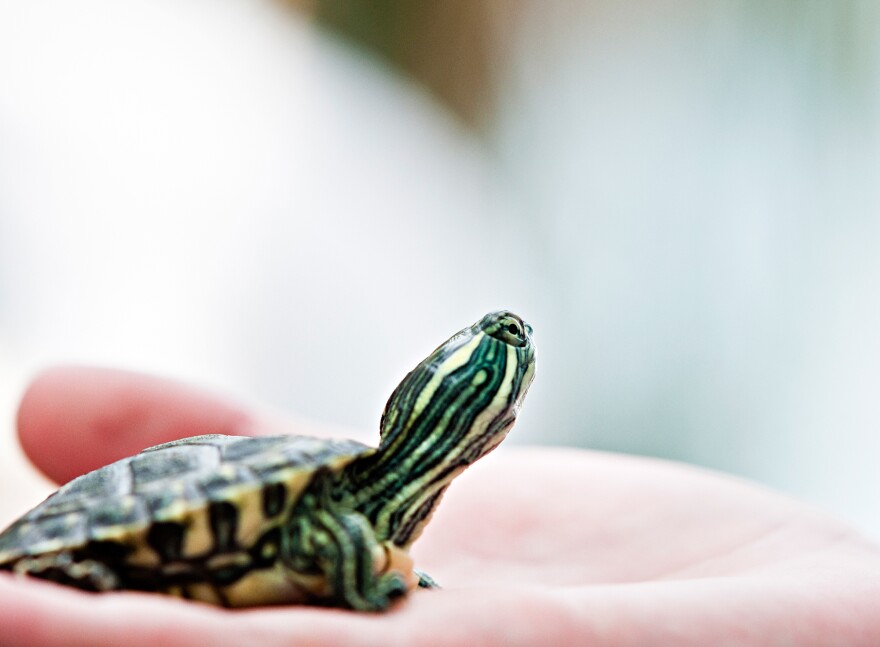Forty years ago, the U.S. outlawed the sale of small turtles as pets because they harbor salmonella, a bacterium that causes a highly unpleasant and occasionally deadly illness in humans.
Now salmonella infections tied to the tiny critters are back, public health officials reported Wednesday in the journal Pediatrics. From May 2011 through September 2013, turtle-associated salmonella was linked to eight outbreaks across 41 states, Washington, D.C. and Puerto Rico, covering 473 illnesses. Some 28 percent of those sickened had to be hospitalized.
Back in the early 1970s, before the FDA ban, catching salmonella from pet turtles was a big problem, with an estimated 280,000 infections per year, mostly in little kids. So if you were around then, you may know about the link between turtles and the bacterium that is now more commonly known for contaminating chicken in the food chain.
But with the passage of time, fewer people are aware of the need to be very careful with hygiene when handling reptiles or amphibians. When public health investigators interviewed 95 patients during the recent outbreaks, only 15 percent knew reptiles were tied to salmonella.
It's still illegal to sell or distribute turtles with shells less than four inches long as pets. (It's okay to sell them for export or for exhibition or educational purposes.) Sales are mostly by vendors at street fairs, outside sporting events, and at flea markets rather than traditional retailers, which makes it hard for the FDA enforce the law. Some of the turtles in one outbreak reported in the study were traced back to a souvenir shop in Florida.
"They're being sold all over the U.S.," says Susan Tellem, executive director and co-founder of , based in Malibu, Calif. "People sell them for $10 in a plastic bag full of water."
Most of those who fell ill in the reported outbreaks were younger than 5. That's not surprising, since children are more susceptible to salmonella infection and small turtles are "small, cute and can fit into kids' mouths," says Maroya Walters, an epidemiologist at the Centers for Disease Control and Prevention and an author of the paper. Hispanics were disproportionately affected, though the researchers don't know why.
Some of the patients in the outbreaks reported having kissed a turtle. But you don't even need to get to first base to increase your risk of catching salmonella, which is a normal inhabitant of the reptilian gut. You can catch it by being splashed with water from the tank of an infected turtle. Or by touching surfaces exposed to turtles or their poop, as might happen if a pet turtle roams freely through the house or if its waste is dumped in the bathroom or kitchen sink.
"We treat every single turtle as if it's infected with salmonella," says Tellem. That means washing her hands with antibacterial soap any time she handles a turtle or anything it touches. She recommends households with children under 13 don't get turtles of any kind, because of the health risk and because kids often become bored with the animals, leading many turtles to be abandoned. The CDC says kids younger than 5 or those with weakened immune systems shouldn't touch amphibians or reptiles.
Turtles aren't the only pets that have been recently associated with salmonella outbreaks. Among the culprits: hedgehogs, tiny frogs and backyard chickens.
People don't understand that turtles can "appear perfectly happy, healthy and clean" and still carry salmonella, says Casey Barton Behravesh, a veterinarian with the CDC and an author of the study.
Katherine Hobson is a freelance health and science writer based in Brooklyn, N.Y. She's on Twitter: @katherinehobson
Copyright 2020 NPR. To see more, visit https://www.npr.org. 9(MDA4MzM1MjM1MDEzMTg5NTk0MzNmOTQ5MA004))


